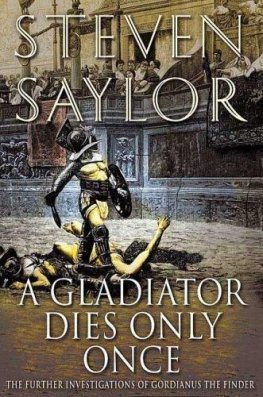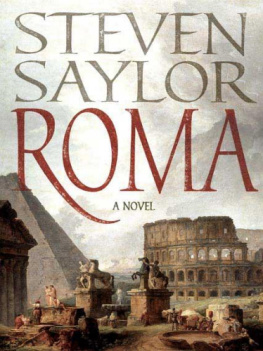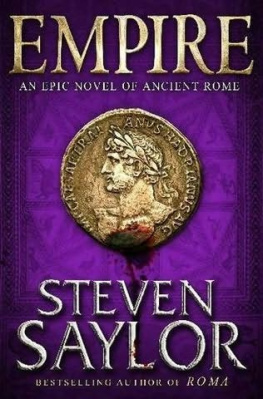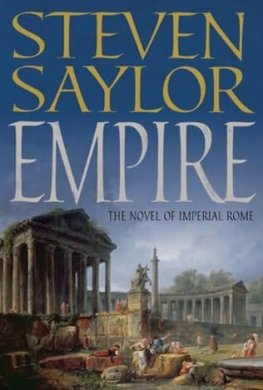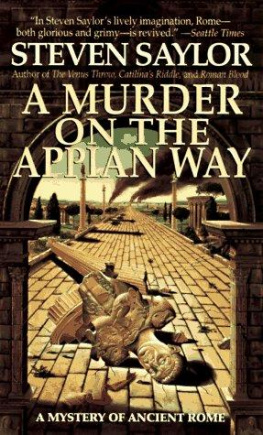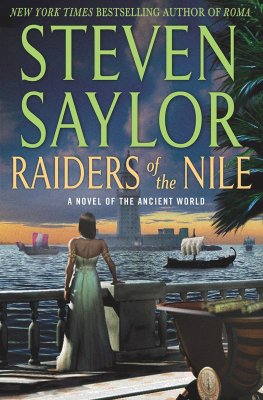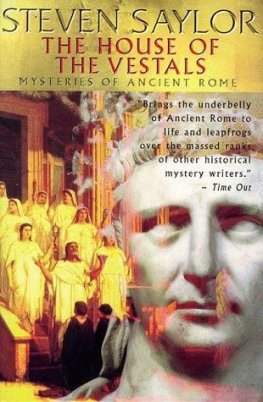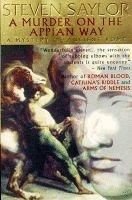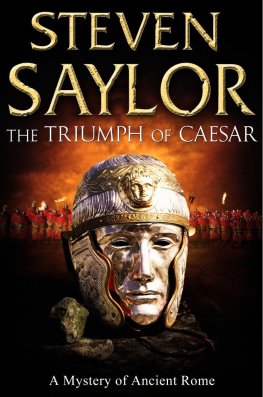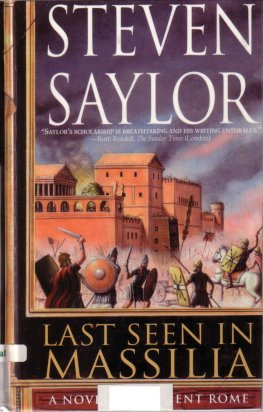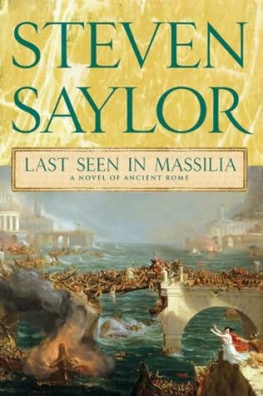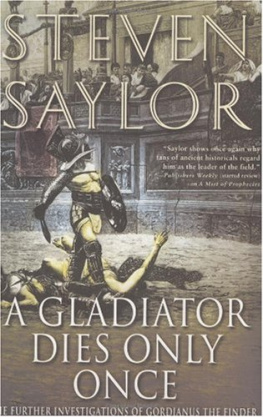Steven Saylor - A Gladiator Dies Only Once
Here you can read online Steven Saylor - A Gladiator Dies Only Once full text of the book (entire story) in english for free. Download pdf and epub, get meaning, cover and reviews about this ebook. genre: Detective and thriller. Description of the work, (preface) as well as reviews are available. Best literature library LitArk.com created for fans of good reading and offers a wide selection of genres:
Romance novel
Science fiction
Adventure
Detective
Science
History
Home and family
Prose
Art
Politics
Computer
Non-fiction
Religion
Business
Children
Humor
Choose a favorite category and find really read worthwhile books. Enjoy immersion in the world of imagination, feel the emotions of the characters or learn something new for yourself, make an fascinating discovery.
- Book:A Gladiator Dies Only Once
- Author:
- Genre:
- Rating:3 / 5
- Favourites:Add to favourites
- Your mark:
- 60
- 1
- 2
- 3
- 4
- 5
A Gladiator Dies Only Once: summary, description and annotation
We offer to read an annotation, description, summary or preface (depends on what the author of the book "A Gladiator Dies Only Once" wrote himself). If you haven't found the necessary information about the book — write in the comments, we will try to find it.
A Gladiator Dies Only Once — read online for free the complete book (whole text) full work
Below is the text of the book, divided by pages. System saving the place of the last page read, allows you to conveniently read the book "A Gladiator Dies Only Once" online for free, without having to search again every time where you left off. Put a bookmark, and you can go to the page where you finished reading at any time.
Font size:
Interval:
Bookmark:
Steven Saylor
A Gladiator Dies Only Once
The Life and Times of Gordianus the Finder:
A Partial Chronology 1
Historical Notes 2 6 5
Natura inest in mentibus nostris insatiabilis quaedam cupiditas veri videndi. (Nature has planted in our minds an insatiable longing to see the truth.)
MARCUS TULLIUS CICEROTusculan Disputations
PREFACEGordianus the Finder, detective of ancient Rome, was introduced in a novel called Roman Blood, first published in 1991.
Over the course of the eight subsequent novels and eighteen short stories of the Roma Sub Rosa series, Gordianus has progressed from the age of thirty to the age of sixty-one. His concubine, Bethesda, has become his wife, and his family has expanded to include a daughter, two adopted sons (one born a slave), and four grandchildren ("a typically Roman extended family," as the classicist Mary Beard commented in the Times Literary Supplement). He has tubbed elbows with the most famous men and women of his time, including Caesar, Cicero, Marc Antony, Pompey, Crassus, and Cleopatra. He has taken part (usually behind the scenes) in many of the most important events of his era, witnessing the final decades of the Roman Republic as it disintegrates into the civil wars that ulti-mately will give rise to the empire of the Caesars.
Through it all, Gordianus's adventures and investigations have been followed by readers in fifteen languages, and a fair number of these readers (thanks to the invention of e-mail) have seen fit to contact his creator with comments, questions, words of encouragement, and notification of the occasional typographical error.
The first nine short stories about Gordianus (all of which take place in the eight-year period between the first two novels, Roman Blood and Arms of Nemesis) were assembled in a collection titled The House of the Vestals. Since that book was published, nine more short stories have been written; readers will find them collected in these pages. Like the stories in The House of the Vestals, all these tales take place early in Gordianus's career. Often at his side, rapidly growing up, is Eco, the mute boy he met in Roman Blood. Also here is Bethesda, Gordianus's Jewish-Egyptian concubine, who eventually becomes his wife. Frequently conferring with Gordianus is his good friend and patron, Lucius Claudius. Cicero, the great lion of the Roman law courts, makes several appearances. Sertorius, the rebel general who set up a rival Roman state in Spain, casts a shadow across the book's beginning and end, and makes an appearance in "The White Fawn." Two towering figures of the late Republic who have figured very little in the novels, Lucullus and Cato, appear in the collection's final story.
One of the joys of writing the Gordianus short stories is the chance to explore various aspects of Roman life and history which simply have not come up in the novels. In these pages, readers will learn about gladiator combats, chariot racing, and the role of the Roman censor, as well as some curious facts regarding food-the making of garam (the fish-pickle sauce essential to Roman cuisine), the origin of Cicero's famous epigram about a piece of cake, and the first appearance of cherries in Rome. (Regarding this last, somewhat touchy subject, see more details in the historical notes at the end of the book.)
Preface
The setting of most of the stories is the teeming, beautiful, endlessly fascinating, endlessly wicked city of Rome, but Gordianus's investigations also take him to Spain, Sicily, the Bay of Naples, and across the breadth of Italy.
The stories are presented in chronological order. At the back of the book, readers will find a detailed chronology, which incorporates all the short stories and novels, along with some notes on historical sources.
Why "Roma Sub Rosa" for the collective series title of the Gordianus novels and stories? In ancient Egypt, the rose was the emblem of the god Horus, later regarded by the Greeks and Romans as the god of silence. Customarily, a rose hanging over a council table indicated that all present were sworn to secrecy. "Sub rosa" (literally, "under the rose") has come to mean "that which is carried out in secret." Thus "Roma Sub Rosa": a history of Rome's secrets, or a secret history of Rome, as seen through the eyes of Gordianus.
THE CONSUL'S WIFE
"Honestly," muttered Lucius Claudius, his nose buried in a scroll, "if you go by these accounts in the Daily Acts, you'd think Sertorius was a naughty schoolboy, and his rebellion in Spain a harmless prank. When will the consuls realize the gravity of the situation? When will they take action?" I cleared my throat.
Lucius Claudius lowered the little scroll and raised his bushy red eyebrows. "Gordianus! By Hercules, you got here in a hurry! Take a seat."
I looked about for a chair, then remembered where I was. In the garden of Lucius Claudius, visitors did not fetch furniture. Visitors sat, and a chair would be slipped beneath them. I stepped into the spot of sunlight where Lucius sat basking, and folded my knees. Sure enough, a chair caught my weight. I never even saw the attendant slave.
"Something to drink, Gordianus? I myself am enjoying a cup of hot broth. Too early in the day for wine, even watered."
"Noon is hardly early, Lucius. Not for those of us who've been up since dawn."
"Since dawn?" Lucius grimaced at such a distasteful notion. "A cup of wine for you, then? And some nibbles?"
I raised my hand to wave away the offer, and found it filled with a silver cup, into which a pretty slavegirl poured a stream of Falernian wine. A little tripod table appeared at my left hand, bearing a silver platter embossed with images of dancing nymphs and strewn with olives, dates, and almonds.
"Care for a bit of the Daily! I'm finished with the sporting news." Lucius nodded toward a clutter of little scrolls on the table beside him. "They say the Whites have finally got their act together this season. New chariots, new horses. Should give the Reds a run for the prizes in tomorrow's races."
I laughed out loud. "What a life you lead, Lucius Claudius. Up at noon, then lolling about your garden reading your own private copy of the Daily Acts."
Lucius raised an eyebrow. "Merely sensible, if you ask me. Who wants to elbow through a crowd in the Forum, squinting and peering past strangers to read the Daily on the posting boards? Or worse, listen to some clown read the items out loud, inserting his own witty comments."
"But that's the whole point of the Daily," I argued. "It's a social activity. People take a break from the hustle and bustle of the Forum, gather round the posting boards and discuss whatever items interest them most-war news, marriages and births, chariot races, curious omens. It's the highlight of many a man's day, perusing the Daily and arguing politics or horses with fellow citizens. One of the cosmopolitan pleasures of city life."
Lucius shuddered. "No thank you! My way is better. I send a couple of slaves down to the Forum an hour before posting time. As soon as the Daily goes up, one of them reads it aloud from beginning to end and the other takes dictation with a stylus on wax tablets. Then they hurry home, transcribe the words to parchment, and by the time I'm up and about, my private copy of the Daily is here wait-ing for me in the garden, the ink still drying in the sun. A comfy chair, a sunny spot, a hearty cup of broth, and my own copy of the Daily Acts-I tell you, Gordianus, there's no more civilized way to start the day."
I popped an almond into my mouth. "It all seems rather antisocial to me, not to mention extravagant. The cost of parchment alone!"
Font size:
Interval:
Bookmark:
Similar books «A Gladiator Dies Only Once»
Look at similar books to A Gladiator Dies Only Once. We have selected literature similar in name and meaning in the hope of providing readers with more options to find new, interesting, not yet read works.
Discussion, reviews of the book A Gladiator Dies Only Once and just readers' own opinions. Leave your comments, write what you think about the work, its meaning or the main characters. Specify what exactly you liked and what you didn't like, and why you think so.

